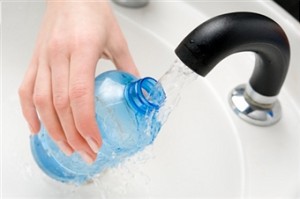 Remember sipping water from a fountain in the park or turning on the kitchen sink for a glass of H2O? Many people today do not have those same experiences because fewer and fewer are drinking tap water. In a recent study, it was revealed that one out of every five U.S. households uses bottled water as their primary or only source of water. Many Americans believe it is a healthier option, but is it really better for you?
Remember sipping water from a fountain in the park or turning on the kitchen sink for a glass of H2O? Many people today do not have those same experiences because fewer and fewer are drinking tap water. In a recent study, it was revealed that one out of every five U.S. households uses bottled water as their primary or only source of water. Many Americans believe it is a healthier option, but is it really better for you?
Tap water and bottled water are regulated by two different agencies. The Environmental Protection Agency oversees tap water and the Food and Drug Administration regulates bottled water. Despite the different governing agencies, the standards of ensuring safety are very similar. Both have strict quality control measures in place to protect the water we drink from harmful bacteria and other contaminates.
Another similarity between tap and bottled water is often the source. There are over 500 bottled water plants in the United States and while some of the bottled water originates from sparkling springs, many others come from a municipal water supply. The water is treated, purified and sold to the public at an inflated cost. In fact, bottled water is estimated to cost up to 1,000 times more than tap water.
Distinguishing which is healthier is hard to do. The levels of certain important minerals in your water, such as calcium and magnesium, depend on what type of bottled water you purchase or the source of your tap water. Areas that use water sources that contain lower levels of these minerals have a higher rate of heart disease than areas with higher levels.
What about taste? Some people prefer the taste of bottled water, citing a funny taste in tap water. The taste that they are referring to is the trace amounts of chlorine used as a disinfectant to guard against the regrowth of microorganisms. Bottled water often utilizes ozone disinfection, which is tasteless and odorless.
The last factor to consider when choosing between tap and bottled water is the effect bottled water consumption has on the environment. It is estimated that Americans consume nearly ten billion gallons of bottled water every year. It is also estimated that less than 20% of water bottles are recycled.
What do you prefer to drink and why? Flushing Hospital wants to know.
All content of this newsletter is intended for general information purposes only and is not intended or implied to be a substitute for professional medical advice, diagnosis or treatment. Please consult a medical professional before adopting any of the suggestions on this page. You must never disregard professional medical advice or delay seeking medical treatment based upon any content of this newsletter. PROMPTLY CONSULT YOUR PHYSICIAN OR CALL 911 IF YOU BELIEVE YOU HAVE A MEDICAL EMERGENCY.
